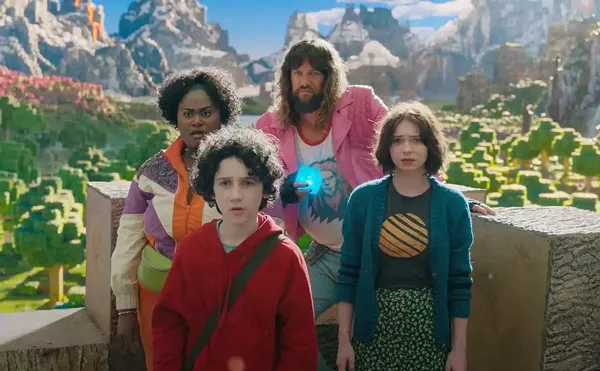It's the "Me" in Me and Orson Welles that Welles would have had a problem with. Not just because Zac Efron is a bright but slight presence, but also because this coming-of-age-in-theater story is so predictably bland and unworthy of Welles' talents. Watching Christian McKay's tremendous performance — the best Orson Welles since, well, Orson Welles — it's easy to imagine the great director firing Efron, dropping the Me and from the title, then rewriting the script in a frenzy of justified ego and inspiration.
And yet, given the string of failed Hollywood projects that would later haunt his career, an older Orson would understand that the only way Richard Linklater (Before Sunset, School of Rock) could get funding for this razor-edged valentine to Welles' theatrical origins was to include the star of High School Musical.
It's 1937, and Welles is in the process of mounting his audaciously pruned version of Julius Caesar, staged in modern fascist dress. Welles stars as Brutus — directing the action, sleeping with a long list of actresses and ingénues, hogging the limelight and feuding with his partner John Houseman (Eddie Marsan) — and Linklater captures the mad energy and constant brink of collapse he cultivated with his outsized ego and genius. Enter Richard Samuels (Efron), a not untalented 17-year-old who gets caught up in this strange and thrilling new world. Cast in a minor role, befriending Joseph Cotten (dead ringer James Tupper) and flirting with sexy Sonja Jones (lovely Claire Danes), he becomes our passive protagonist and tour guide to the world of backstage politics and blossoming celebrity. It's a device that didn't really work in Cameron Crowe's Almost Famous, nor this summer's The Great Buck Howard. And it doesn't work here. Efron's likable enough, but hardly a character worth caring about.
Luckily Linklater has McKay, who explodes into every scene he's in (and there are many), commanding our attention, affection and even scorn. So perfect is his performance that it feels like Welles stepped through time to join the cast. McKay is more than a decade older than the 22-year-old Orson he depicts, but you never doubt for a moment you're watching the real deal. He captures the director's huge personality — after all, who else would use an ambulance to chauffer him through Manhattan traffic? — and the ambitions, artistry and arrogance he wore on his sleeve. Yet there are human touches, giving us a glimpse into what might've made this fascinating but flawed man tick, and even why he ultimately failed in Hollywood. In the theater, Welles nurtured an atmosphere of chaos, allowing him to step in at the last moment and save the day with his mercurial brilliance. Film, however, is a costly, disciplined and unforgiving medium for artists who like to fly by the seat of their pants.
Linklater, who can hardly be compared to Welles, treats the narrative with his laid-back approach, which highlights the thinness of Efron's storyline but does a great job of putting you in the theater as Welles' artistic vision is created then presented on opening night. And like Efron, you can't help but be swept away.
Sometimes corny, sometimes clichéd, Me and Orson Welles features a genius performance about a genius director in a less-than-genius film. There's a cruel irony in there that only Orson Welles could fully appreciate.
Opens Friday, Dec. 11, at the Main Art Theatre (118 N. Main St., Royal Oak; 248-263-2111).
Jeff Meyers writes about film for Metro Times. Send comments to letters@metrotimes.com.






